Day-to-day Preparations
13:10 min. - During summer, men were responsible for providing food for everyone, repairing canoes and supporting the less fortunate. Boys were encouraged to participate through play. This was also the time when the midwife met with mothers-to-be to find out when and where they intended to give birth in the bush.
Transcription
Narrator - In the summer, the men had to provide food for everyone, repair the canoes and support the destitute. Boys were encouraged to participate through play.
Armand Germain - I'll tell you a story about when I was in the bush. There were quite a few of us at that time, 11 families in all. There were uncles, relatives and one elder in our family. But before we even got very far into the bush, two elders spoke about the following: They knew where to find animals, berries and red berries, where the caribou and beavers would be. They discussed many things. Using the sunset as a guide, they spoke about the places we could reach, which river it was, its name, and the side from which we would arrive. They described all this, using the image of the sunset as a guide. Then they decided when we would leave. Even though we were a large group, (there must have been around 20 canoes), we all left together. One of the elders directed the manoeuvre and decided where to stop for lunch. He knew the place well, because he had gone there very often in his canoe. Later, another elder took his place. We were last. He told us where to go and from which side of the Caniapiscau River we should arrive. Before the group split up, we had a one-day meeting. We planned the spot for our Christmas gathering.
Alain Nepton - Lac St-Jean is the place where several rivers meet, it is round and looks like a star, with all the rivers surrounding it. The longest rivers are 400 to 500 km long. The Peribonka River is the longest. It goes all the way to the center of Québec and towards James Bay. People from here travelled there, they encountered people from Betsiamites, the Mistassini Cree and the Atikamekw from the West. The Innu went into the bush, they didn't stay here very long. In fact they resided mainly in the bush, if I may say so. They left in their canoes in August. The ones that were closest came back for Christmas. The others only came back in the spring and sometimes only the following year.
Narrator - Johnny Bosum is a good example of the influence of this junction. Johnny is from Mistassini and has lived in Pointe-Bleue for a long time. His mother comes from the James Bay community of Washkaganish, and his father is from Betsiamites.
Délima André - All the Innu from Uashat and Mishta Shipu went into the bush. But the eldest among them stayed close to the sea, and still had to support themselves. Our father always took care of us with no help from the government. We lived off the products of hunting and fishing, just like everyone else. The store gave us credit for our supplies and we paid the bill when we came back from trapping. With the rest of the money, we bought supplies for a year in the bush: 3 barrels of flour and a case of tea. We purchased large amounts of tea for the hunting season. We all went west to the Uashat mission during the priest's annual passage in August. There was a procession in honour of the Virgin Mary and afterwards, all the Innu went into the bush. Actual preparations lasted just one night.
Phillipe Pietacho - There were many places in the Mingan area where the Innu entered the bush: Shipaitakan, the Magpie River and the St. Jean River. And here at the Romaine River, there's a portage close by. When they went down to the sea, the Innu lived here on the islands. This is where they hunted seal for oil and to make moccasins.
The Innu always hunted here in the spring. In May, camps were set up everywhere to hunt ducks, a hunt that enabled us to meet up with old friends after a winter in the bush. Several of us were positioned on various islands, and when we fired on a flight of ducks, we aimed so that the birds that weren't hit would have to fly in the direction of our friends on the neighbouring islands. It was a lot of fun. This is where we went to pluck our ducks. We would come here at high tide. Nowadays, there are still many ducks. That's the life I knew. Every year, we were very eager to see the islands and our friends once again. Before leaving, we always said goodbye with a big feast.
Shimun Mestenapeo - We went down to the sea in June and left in July. We lived almost entirely in the bush.
Philippe Pietacho - Drum
Music - Rodrigue Fontaine, Bill St-Onge, Luc Bacon
-
-
Day-to-day Preparations
13:10 min
-
- anushkanat
- raspberries
- atshikuianessina
- sealskin boots
- inniminana
- blueberries
- kusseumieush
- all-purpose bag
- mamenikuashuna
- crafts
- massekushkamiku
- peat moss
- maushunanu
- berry picking
- pashakanu massekushkamiku
- they dry sphagnum moss
- tipainissatamu apakuanu
- she measure the canvas with her hand
- tshiashku-uaua
- seagull eggs
- uinipeku
- the sea




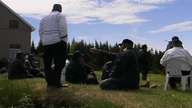
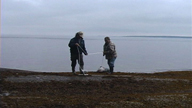
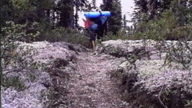
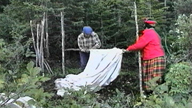
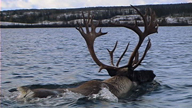
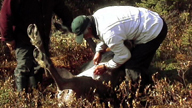
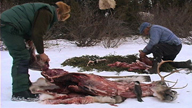
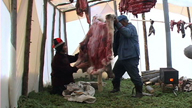
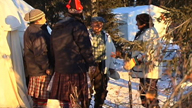
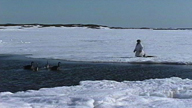
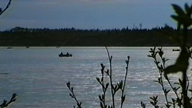
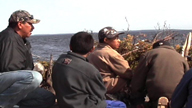
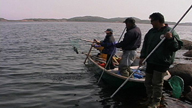
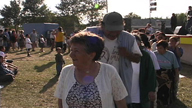
Be the first to comment!